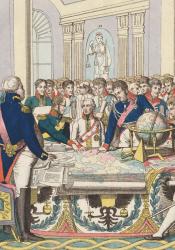Congress of Vienna
The Congress of Vienna marked the final defeat of Napoleon Boneparte. The event resulted in the recarving of European boarders. The congress started in November 1814 and ended in June 1815. Many states affected by the Napoleonic Wars took part in this event. France lost all of its territory that was gained during the Napoleonic Wars. The goal of the meeting was to give back territory to the European states and to also restore a balance of power to the states. This was done to prevent future conflict and wars over land disputes. Prussia, Austria, and Russia gained a large amount of territory. Prussia gained German states and Austria gained Venice and a lot of Northern Italy. Finally, Russia gained sections of Poland.
Something to note is that the Congress was finalized days before the actual defeat of Napoloan at Waterloo. The dividing of the states was also only favorable to States who had manarchs as rulers. The event did not favor nationalistic and liberal movements taking place throughout Europe.
But what is The Congress of Vienna's significance to MIddlemarch? In chapter 20 while Dorothea and Casaubon are talking. Casaubon mentions the significance of going to Rome after the fall of Napoleon. This means Casaubon visited Rome within the past 15 years. Also Dorothea and Casaubon would not have went to Rome for their Honeymoon if not for the Congress of Vienna. When Napoleon controlled Italy, Rome was not open to tourism. This is stated in the same discussion between Dorothea and Casaubon in Middlemarch. This event could also have implications in the further chapters of MIddleMarch. The Papal States (area near Rome) suffered badly during the Napoleonic Wars.
“Congress of Vienna.” Wikipedia, Wikimedia Foundation, 30 Aug. 2020, en.wikipedia.org/wiki/Congress_of_Vienna.
“Napoleonic Wars.” Wikipedia, Wikimedia Foundation, 7 Sept. 2020, en.wikipedia.org/wiki/Napoleonic_Wars.
Waldie, Dr Derek J.P. THE NAPOLEONIC WARS 1803 - 1815 (G3c) POPE PIUS VII RETURNS TO ROME 1814, www.timewisetraveller.co.uk/inquisition1803.html.

